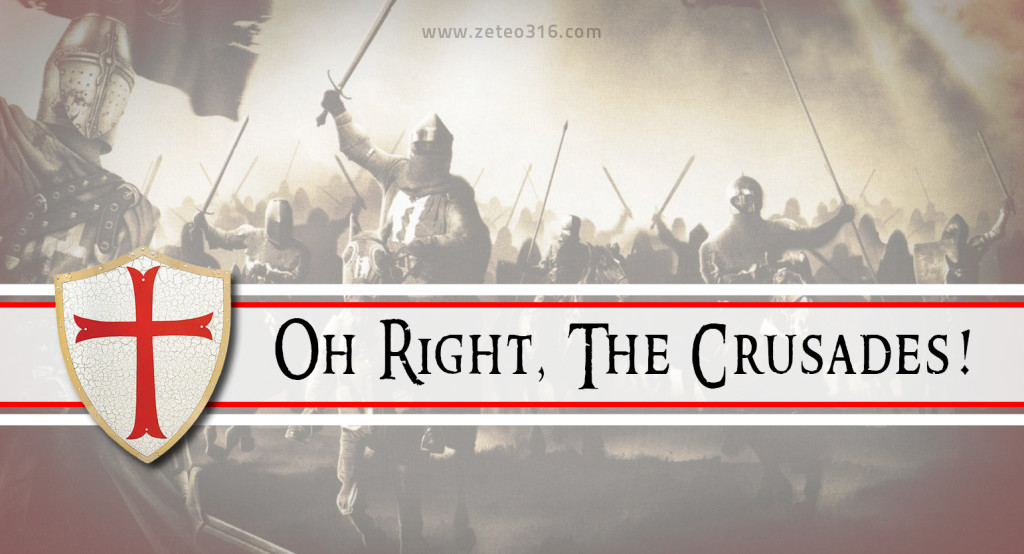
I’ve just finished reading ISIS-The Heart of Terror: The Unexpected Response Bringing Hope For Peace *(affiliate link) by Eugene Bach from Back to Jerusalem
Honestly, in light of the recent Paris Attacks and ISIS dominating the news, I can’t quite decide if the timing of reading this book was perfectly spot on or too much of an overload. The book has so much good information that I’ll be making several posts relating to it. I’m quite sure that once Alf reads it, he’ll be doing a review on it as well.
We’ve all seen the memes and comments from the liberal left comparing ISIS to the Crusades. If not comparing, then at least trying to remind everyone that the Christians of the past were just as bad as the Muslims of the present. I think Eugene Bach makes a good distinction between the two:
pp 66-67
In an attempt to point out that Christians are also guilty of hideous war crimes, people will bring up the crusades; but, keep in mind that, at the time of the first crusade, Islam had been invading and destroying Christian countries for four centuries. After four hundred long, hard years of being attacked, conquered, raped, pillaged, and enslaved (longer than the Unites States has been a country), Europe finally launched its offense, which is credited with saving Europe from being forced into Islam.
When Muslims conquered a country, their defeat was absolute. The invading armies were imperialistic and colonialist. They expected to benefit from their efforts by living off their conquests. Men were slaughtered, women were raped, and children were taken as slaves. Raped women gave birth to children who grew up to be slaves, resulting in a constant supply of workers and income. Everyone was forced into Islamic society. In most cases, everyone was forced to either convert or pay jizya.
It was not long before France was under attack, which was a turning point in the march of Islam.
It should be noted that this history should not be used to demonize Islam. Bloodshed, rape, and enslavement were not unique to the Islamists. They were common practices during that time. Some Christian armies practiced rape, murder, and theft. The actions displayed by the Muslim armies, which would be considered barbaric today, were not out of the ordinary. In fact, it could be argued that, in some cases, Muslims were liberating people who were under the control of an equally tyrannical government; for this reason, many indigenous people welcomed the invading Muslims with open arms, hoping for relief and justice.
The point here is not to evaluate the actions of the Muslim armies in comparison to today’s standards. The rules of war dictated by the Geneva Convention cannot be used to assess the practices of the Muslim armies during that time. No, the primary point is that the spread of Islam did not take place in a peaceful manner. The historic expansion of Islam was not any different from the examples set by the prophet Muhammad and the teaching of the Koran.
This could not be any more distinct from the early spread of Christianity, when the blood of Christian martyrs was sacrificed instead of the blood of an enemy. Early Christianity was built on the foundations of nonviolence and self-sacrifice. After all, Jesus Christ, who never killed or smote another human being, willingly gave His life on the cross for the sins of all people. In contrast, the Islamic military warrior Muhammad held a sword soaked in the blood of his enemy.
Note: While “Christian armies” practiced rape and murder at times – when they did so, they departed from Christian tenets. In contrast, the Muslim armies were following Muhammad’s guidelines.
The concern now is that Islamists (ISIS etc) are also operating under the guidance of the Koran. They are following in the same footsteps of Muhammad. Unfortunately, Western leaders publicly deny that Islam has anything to do with ISIS and terrorism. They are not recognizing that the steady influx of Muslims is changing the face of Europe. For more on this, see our article Europe at a Crossroads. See also this disturbing video on the current refugee crisis in Germany.
